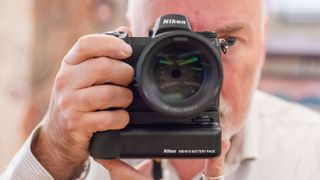Before anyone decides to become a keyboard warrior, yes I do know what a battery grip does, yes I know they have a shutter button so you can shoot in portrait mode and yes, I know that people with big hands often find them more comfortable to shoot with. But for me they’re expensive, add unnecessary weight and, honestly, I just think they make the camera look ugly.
When I first bought my Fujifilm X-T3 there was an offer at retailer Wex Photo Video that meant I got a free battery grip with it. I knew there was no way I was going to keep it so, before I had even picked it up from the shop, I had listed and sold it on Facebook Marketplace. The way I shoot really doesn’t justify having one; I mostly take portraits, which arguably would benefit from the vertical shutter button, but I've never had any issue using the standard one on the camera.
• These are the best camera batteries – you'll be amazed at the range and price difference
I read an article that having a battery grip on your camera makes you look more professional, which I fundamentally disagree with. That’s basically saying, the bigger your camera is the more professional you look. I don’t care whether you shoot with a Fujifilm X100V or a Nikon Z9; if you have an eye for taking a good photo, the equipment you use is irrelevant. And anyone who judges a photographer by the kit really needs to reconsider their outlook on photography.
The way I see it, a battery grip generally costs between $/£150 and $/£400 , depending on what model you need. For most people that’s a pretty big expense, and one that I find hard to justify. You also have to buy extra batteries on top of that and, if you’re buying first-party batteries, they’re not cheap, either.
I shoot with a Sony A7 III. The official Sony NP-FZ100 batteries cost around $78/£65 each (or a little less if you buy decent third-party brands), but if I was to invest in the battery grip that would cost me around another $348/£239. With that money, I’m halfway to being able to get a new lens (not a pro telephoto zoom by any means but something like the Tamron17 - 28mm f/2.8 Di III RXD), which appeals to me much more.
If you regularly shoot time-lapses or record video for an extended period of time (although depending on which camera you use, you may suffer overheating issues) I can understand the necessity of being able to hot-swap batteries. But since it’s something I don’t shoot, I really have no need for one.
All my camera kit has been purchased with the intention of traveling with it, so I’ve gone for the smallest and lightest setup possible. I went for the Sigma 28-70mm f/2.8 DG DN lens over the Sony 24-70mm f/28 G Master not just because it’s drastically cheaper, but because the Sigma is also smaller and lighter. So basically, what I'm trying to say is, why spend money to make your camera bigger, heavier, and less attractive when you can buy batteries to carry in your pocket instead?
If you really don't want a chunky body, check out the best Micro Four Thirds cameras that punch well above their weight class. And if you want to go smaller still, take a look at the best compact cameras.



